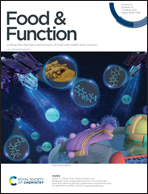Genomic and in vitro properties of the dairy Streptococcus thermophilus SMQ-301 strain against selected pathogens†
Abstract
Cumulative studies have suggested that probiotic bacterial strains could be an effective alternative in inhibiting conditions caused by foodborne and vaginal pathogens. The use of genomic techniques is becoming highly useful in understanding the potential of these beneficial microorganisms. This study presents some genomic and in vitro properties of the Streptococcus thermophilus SMQ-301 strain against foodborne and vaginal pathogens (Staphylococcus aureus, Escherichia coli, and Gardnerella vaginalis) to validate its use in dairy food formulations. Genomic analyses include bacteriocin production, stress response systems, antioxidant capability, and RAST-based functional annotation. In vitro investigations focused on the antimicrobial effects of the S. thermophilus SMQ-301 cell-free solution (CFS) against the selected pathogens after enzymatic actions and pH treatments, assessment of cytotoxic effects using murine RAW264.7 cells, and assessment of organic acid production levels using supplementary carbon sources. The results show that the S. thermophilus SMQ-301 genome possesses essential pathways for stress management, antioxidant activities, and bacteriocin production. For the first time, the bacteriocin-producing peptides of S. thermophilus SMQ-301 are reported, which gives an insight into its inhibitory potential. In vitro, the CFS of S. thermophilus SMQ-301 had significant (P < 0.05) antimicrobial effects on the selected pathogens, with S. aureus ATCC25923 being the most resistant. All antimicrobial activities of the CFS against the selected pathogens were eliminated at pH 6.5 and 7.0. S. thermophilus SMQ-301 CFS yielded the highest lactic (25.58 ± 0.24 mg mL−1) and acetic (5.53 ± 0.12 mg mL−1) acid production levels, with 1% fructooligosaccharide (P < 0.05). The S. thermophilus SMQ-301 strain also lowered murine RAW264.7 cell activities from 101.77% (control) to 80.16% (T5 – RAW264.7 cells + 1 × 109 CFU mL−1 cells) (P < 0.05). This study showed that although the S. thermophilus SMQ-301 strain had excellent genomic characteristics, the in vitro effects varied markedly against all three pathogens. In all, the S. thermophilus SMQ-301 strain has promising applications as a potential probiotic in the food and allied industries.



 Please wait while we load your content...
Please wait while we load your content...